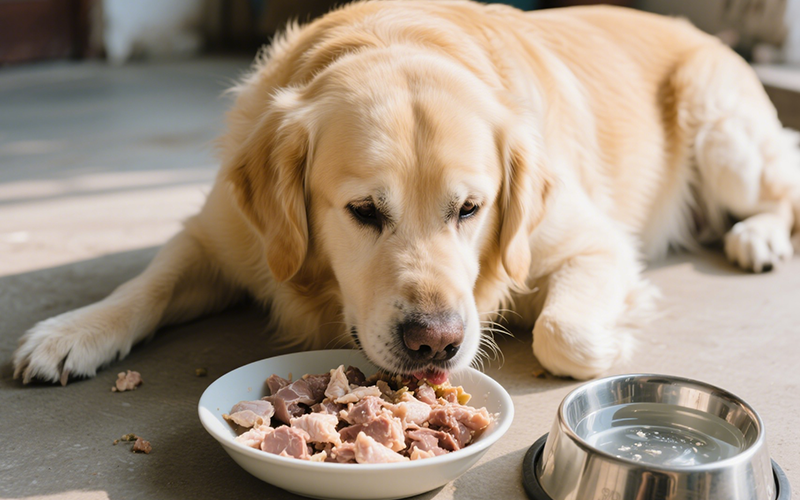Can Dogs Eat Cinnamon Applesauce (A Little Bit)? The Sweet and Spicy Truth!
- 28 May 2025 09:03
Applesauce is a common household staple, often enjoyed for its sweet, comforting flavor. When it's swirled with aromatic cinnamon, it becomes even more enticing. As you savor a spoonful, your canine companion might look on with hopeful eyes, leading you to wonder: can dogs eat cinnamon applesauce a little bit? The answer is generally yes, most dogs can safely consume a small amount of plain, unsweetened cinnamon applesauce as an occasional treat, provided it does not contain harmful additives like xylitol. However, there are several important caveats and considerations to ensure this human food remains a safe and enjoyable indulgence for your furry friend.

Deconstructing Cinnamon Applesauce: What's Inside?
To understand its suitability for dogs, let's break down the typical components of cinnamon applesauce:
1. Apples (The Main Ingredient)
Apples themselves, when prepared correctly (cores, seeds, and stems removed), can be a healthy treat for dogs. They offer:
Vitamins: Good source of Vitamin A and Vitamin C, which support immune function, skin health, and vision.
Dietary Fiber: Apples contain soluble and insoluble fiber, which can aid in digestion and promote regular bowel movements. Pectin, a type of soluble fiber in apples, can be particularly beneficial.
Antioxidants: Help combat free radicals in the body.
Low in Protein and Fat: Making them a relatively light treat option.
In applesauce form, the apples are cooked and pureed, making them easy to digest.
2. Cinnamon (The Spice)
Cinnamon is the key flavoring agent here.
Is Cinnamon Safe for Dogs? Yes, cinnamon (specifically Ceylon cinnamon, and Cassia cinnamon in very small amounts) is generally considered non-toxic to dogs in small quantities. It's not an essential nutrient, but it's not usually harmful if a little is licked up or ingested.
Potential Benefits (Anecdotal/Minor in Small Doses): Some studies suggest cinnamon may have anti-inflammatory properties or help regulate blood sugar, but the amounts a dog would get from a "little bit" of cinnamon applesauce are unlikely to have significant therapeutic effects.
Too Much Cinnamon: Large quantities of cinnamon (especially Cassia cinnamon, which is more common and contains higher levels of coumarin) can cause irritation to a dog's mouth, lungs (if inhaled as powder), and digestive system. It can also potentially affect blood sugar levels or, in very high doses, cause liver issues due to coumarin. However, the amount typically found in a "little bit" of cinnamon applesauce is usually well below problematic levels.
3. Sugar (The Big Concern in Many Commercial Varieties)
This is often the primary issue with store-bought applesauce, including cinnamon varieties.
Added Sugars (Corn Syrup, Sucrose, etc.): Many commercial applesauces are loaded with added sugars to enhance sweetness. Dogs do not need added sugar in their diet. Excess sugar can lead to:
Weight gain and obesity.
Dental problems (cavities, gum disease).
Digestive upset (diarrhea).
Increased risk of diabetes over time.
Natural Sugars: Apples themselves contain natural sugars (fructose). Even in unsweetened applesauce, these sugars are present and contribute to the calorie count.
Opt for UNSWEETENED applesauce only.
4. Artificial Sweeteners (Especially XYLITOL – A Major Danger)
Some "sugar-free" or "no sugar added" applesauces might contain artificial sweeteners.
XYLITOL IS EXTREMELY TOXIC TO DOGS. Even very small amounts of xylitol can cause a rapid, life-threatening drop in a dog's blood sugar (hypoglycemia) by stimulating a massive insulin release. It can also lead to liver failure. Symptoms include vomiting, weakness, lethargy, incoordination, collapse, and seizures. ALWAYS check the ingredient list meticulously for xylitol before offering any human food to your dog, especially "sugar-free" products.
Other artificial sweeteners like sucralose, aspartame, or stevia are generally considered less dangerous than xylitol in small amounts but can still cause digestive upset in some dogs and offer no nutritional benefit. It's best to avoid them.
5. Preservatives and Other Additives
Some commercial applesauces may contain artificial colors, flavors, or preservatives like citric acid or ascorbic acid (Vitamin C, which is fine). While minor additives are often tolerated, simpler is always better for dogs.
So, when considering "can dogs eat cinnamon applesauce a little bit?", the safety hinges critically on it being unsweetened and free of xylitol.
Benefits of Plain, Unsweetened Cinnamon Applesauce (in Small Amounts)
When the applesauce is truly plain (just apples and cinnamon, no added sugar or harmful ingredients), a small amount can offer:
Hydration: Applesauce has a high water content.
Digestibility: Cooked, pureed apples are easy on the stomach.
Fiber: Can aid in regular bowel movements.
Low-Calorie Treat Option (Unsweetened): Compared to many commercial dog biscuits, plain unsweetened applesauce is relatively low in calories.
Palatability: Many dogs enjoy the taste.
How to Safely Offer Cinnamon Applesauce to Your Dog
If you decide to let your dog try a little cinnamon applesauce, follow these guidelines strictly:
CHOOSE UNSWEETENED, PLAIN APPLESAUCE: This is the most important step.
Read the ingredient label carefully. Ensure "apples" are the primary (or only) ingredient, along with water and perhaps cinnamon.
NO ADDED SUGAR: Avoid any products with sugar, corn syrup, high-fructose corn syrup, or other sweeteners listed.
ABSOLUTELY NO XYLITOL: Double-check and triple-check for xylitol. If it's listed, DO NOT give it to your dog.
Ensure Cinnamon is the Only Spice: Avoid applesauce blends with other spices like nutmeg, which can be toxic to dogs in larger quantities (though the amount in a mixed spice applesauce is usually low, plain cinnamon is safer).
Portion Control – A "Little Bit" Means a Little Bit:These are general guidelines for an occasional treat. It should not be a daily food item. Remember the 10% rule: treats should not make up more than 10% of your dog's daily caloric intake.
Small Dogs (e.g., Chihuahua, Yorkie): Half a teaspoon to one teaspoon.
Medium Dogs (e.g., Beagle, Cocker Spaniel): One to two teaspoons.
Large Dogs (e.g., Labrador, German Shepherd): One to two tablespoons.
Introduce Slowly: If your dog has never had applesauce or cinnamon before, start with an even smaller amount (e.g., a tiny lick) to see how they react. Monitor for any signs of digestive upset (vomiting, diarrhea, gas) or allergic reaction (itching, hives – though rare for apples or cinnamon).
Serving Ideas:
Offer it directly from a spoon.
Mix a small amount into their regular food.
Stuff a small amount into a Kong toy and freeze for a longer-lasting treat.
Consider Making Your Own: The safest option is often to make homemade unsweetened applesauce. Simply cook peeled, cored, and chopped apples with a little water until soft, then mash or puree. You can add a pinch of plain Ceylon cinnamon. This way, you control all the ingredients.
| Applesauce Type | Suitability for Dogs (A Little Bit) |
| Plain, Unsweetened Applesauce (with or without a pinch of cinnamon) | Generally Safe in small, occasional amounts. Check for no xylitol. |
| Applesauce with Added Sugar | Not Recommended. Unhealthy due to excess sugar. |
| Applesauce with Xylitol | EXTREMELY DANGEROUS / TOXIC. Never give. |
| Applesauce with Other Artificial Sweeteners | Best to avoid; can cause GI upset. Offers no benefit. |
| Applesauce with Other Spices (e.g., Nutmeg) | Avoid. Nutmeg can be toxic in larger doses; stick to plain cinnamon only. |
When Cinnamon Applesauce Might Be a Bad Idea
Even if unsweetened and xylitol-free, there are situations where cinnamon applesauce might not be suitable:
Diabetic Dogs: Applesauce, even unsweetened, contains natural sugars that can affect blood glucose levels. Diabetic dogs should generally avoid it, or it should only be given with explicit approval and guidance from a veterinarian.
Overweight Dogs: While lower in calories than many treats, the calories from applesauce still count. If your dog is on a weight management plan, factor these treats into their daily allowance or opt for even lower-calorie options (like plain green beans).
Dogs with Sensitive Stomachs: Some dogs might experience digestive upset even from plain applesauce due to the fiber or acidity.
Dogs with Known Allergies: Though rare, allergies to apples or cinnamon can occur.
PettureX: Your AI Assistant for Pet Food Queries
Navigating the nuances of human foods for pets can be tricky. The PettureX app is designed to be an AI-powered resource for pet owners seeking quick, general information.
PettureX offers:
24/7 AI Consultation: You can ask general questions like "Is cinnamon okay for dogs?" or "What should I look for in safe applesauce for my dog?" The AI chatbot can provide instant information based on common veterinary advice and food safety principles. It will highlight the importance of checking for added sugars and xylitol, and recommend moderation, always reminding users that for specific health concerns or if a pet ingests something potentially harmful, consulting a veterinarian is paramount.
PettureX can help you make more informed choices by providing accessible general knowledge, supporting your efforts to keep your pet safe and healthy.
Conclusion: A Spoonful of Caution for Cinnamon Applesauce
So, to answer the core question: can dogs eat cinnamon applesauce a little bit? Yes, they can, but with significant conditions. It absolutely MUST be:
Unsweetened (no added sugars of any kind).
Free of Xylitol and other artificial sweeteners.
Contain only cinnamon as an added spice (no nutmeg or complex spice blends).
Given in very small quantities as an occasional treat.
When these conditions are met, plain cinnamon applesauce can be a relatively safe and enjoyable low-calorie treat for many healthy dogs. However, due to the high risk of harmful ingredients in many commercial products, always read labels meticulously or, better yet, make your own simple version at home. Your dog's health and safety are always the top priority, so when in doubt, opt for a treat specifically made for canines or consult your veterinarian.
Frequently Asked Questions (FAQs)
Q1: What if the applesauce only has "natural flavors" listed with cinnamon?
A: "Natural flavors" can be a vague term. If the applesauce is unsweetened and the "natural flavors" are simply derived from apples and cinnamon, it might be okay. However, if you're unsure what those flavors entail, it's safer to choose a product with a simpler ingredient list (just apples, water, cinnamon) or make your own.
Q2: Can puppies eat cinnamon applesauce?
A: Yes, puppies can have a very tiny amount of plain, unsweetened, xylitol-free cinnamon applesauce once they are eating solid food. However, their digestive systems are more sensitive, so introduce it extremely cautiously and in minuscule portions. Their primary nutrition must come from high-quality puppy food.
Q3: How much cinnamon is too much for a dog?
A: The amount of cinnamon in a small serving of appropriately prepared cinnamon applesauce is typically very low and unlikely to cause issues. Ingesting large amounts of dry cinnamon powder (e.g., more than a teaspoon for a small dog) can cause irritation and other problems. Cassia cinnamon contains more coumarin, which can be problematic in high doses over time. Stick to the small amounts naturally present in a lightly spiced applesauce.
Related

Why is Regular Dog Grooming So Important?
- 21 Jun 2025
Can Dogs Eat Kiwis? A Vet-Approved Guide to This Fuzzy Fruit
- 10 Jun 2025
Can Dogs Eat Curry? Unpacking Risks, Benefits, and Safe Alternatives for Your Canine Companion
- 3 Jun 2025
Can Dogs Eat Cooked Carrots? A Crunchy & Colorful Canine Query!
- 29 May 2025
Can Dogs Eat Cooked Cabbage? Unveiling the Crunchy Truth for Your Canine!
- 29 May 2025
Can Dogs Eat Citrus? Peeling Back the Zesty Truth for Your Pup!
- 28 May 2025
Can Dogs Eat Chorizo? Sizzling a Warning for Your Furry Friend!
- 27 May 2025
Can Dogs Eat Chili? A Spicy Topic for Canine Consumption!
- 27 May 2025
Can Dogs Eat Raw Chicken? Unveiling the Risks and Realities
- 26 May 2025
Can Dogs Eat Chicken Gizzards? A Gut Feeling About This Meaty Morsel!
- 26 May 2025
